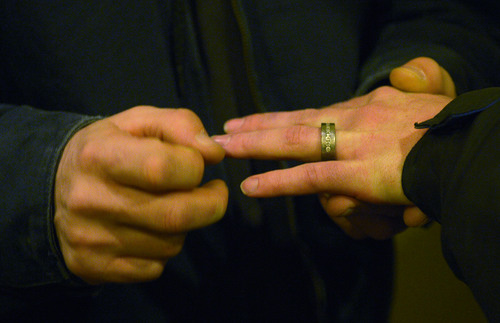This is an archived article that was published on sltrib.com in 2013, and information in the article may be outdated. It is provided only for personal research purposes and may not be reprinted.
Gov. Gary Herbert's first statement after U.S. District Judge Robert J. Shelby's decision striking down Utah's gay-marriage ban was a tell-tale sign. He said he was directing state lawyers to "determine the best course to defend traditional marriage within the borders of Utah."
The "borders of Utah"? Do we really want to have our own set of individual rights separate from other Americans? Shelby's decision recognized Utah's right to define marriage, but he also made clear that the definition still has to fit within the U.S. Constitution. Amendment 3 doesn't.
Shelby could have extended the battle by holding a trial on Amendment 3. Instead, after reviewing filings from both the state and the three couples challenging Amendment 3, he concluded the law interferes with the couples' rights of due process. It was the first federal ruling striking down a state ban on same-sex marriage since the U.S. Supreme Court killed the Defense of Marriage Act (DOMA) in June. It won't be the last.
So unanticipated was the decision that the state apparently didn't even have paperwork ready to ask the judge to stay the decision pending an appeal. With Amendment 3 discarded and no stay in place, county clerks were suddenly deluged with same-sex couples Friday afternoon.
The governor later said the decision caused "a chaotic situation in our state that requires an expedited judicial resolution." What that really means is he didn't like the expedited resolution Shelby gave him, so he's calling it chaos. Scenes from the clerk's office Friday showed joyful pandemonium, but it was hardly chaos.
The governor's hope for a different outcome comes from language in the Supreme Court's DOMA decision that says states have the role of defining marriage for themselves. Utahns had done exactly that with a 2004 election approving Amendment 3, which defined marriage as a union exclusively between one man and one woman.
But in continuing to pursue Amendment 3 after the Supreme Court ruled, Utah ignores the rest of the DOMA decision, which states that DOMA violated the Fifth Amendment's due process by putting same-sex couples "in an unstable position of being in a second-tier marriage."
Shelby used the 14th Amendment to apply that same logic to Utah's law. Passed after the Civil War to keep Southern states from denying rights to African-Americans, the 14th Amendment requires that states can't have a different standard for due process than the federal government has.
Shelby rightly dismissed the state's argument that granting marriage rights to same-sex couples somehow denies rights to heterosexual couples: "The State's current laws deny its gay and lesbian citizens their fundamental right to marry and, in so doing, demean the dignity of these same-sex couples for no rational reason."
Utah may be unique among states, but it's still a state. If the governor wants to see real chaos, it would be a return to pre-Civil War America where states can define their own rights for individuals. Utahns work very hard to attract out-of-state workers and visitors, and that work is seriously undermined if we tell them they won't have all their due-process rights when they get here.
Nothing in the decision commands religious organizations to do anything differently. The two largest religions in Utah (Mormons and Catholics) have been big players in the fight to stop same-sex marriage, and they remain convinced that marriage should only be between one man and one woman. That can still be true for them.
But to the extent that marriage is a legal right, it must be a right for all Americans, and that includes all Utahns.
The governor is determined to continue the quixotic fight for Amendment 3, and he has plenty of supporters in that. But the rest of us should move on to the healing. Gay marriage proponents should resist further antagonism or gloating and instead engage in caring and understanding dialogue.
They can do so confidently, knowing that Friday's events offer full evidence that we live in the land of the free and the home of the brave.



